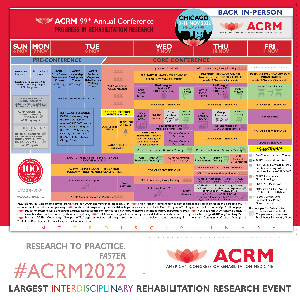Back
COVID-19
Characteristics of a Post-Coronavirus-19 Sample undergoing Rehabilitation: An Exploratory Study
Friday, November 11, 2022
9:53 AM – 9:58 AM
Location: Station 5

Ellen Farr, MD
Fellow
Mayo Clinic College of Medicine and Science
Rochester, Minnesota, United States
Thomas F. Bergquist, Ph.D., ABPP-Cn, FACRM
Associate Professor
Mayo Clinic
Rochester, Minnesota, United States
Presenting Author(s)
Research Objectives: Describe sample presenting to a brain rehabilitation clinic with cognitive impairment after COVID-19 infection.
Design: Pre- and post-intervention measures from a clinical sample.
Setting: Outpatient Brain Rehabilitation Clinic
Participants: Eight patients undergoing outpatient rehabilitation after COVID-19 infection (Mean age = 47.1, Range: 38-55 years; females = 6, males = 2; 4 hospitalized at time of acute infection, Mean time to treatment 243 days, Range: 84-415 days).
Interventions: Treatment by an experienced team of interdisciplinary providers with composition and treatment frequency tailored to individual needs.
Main Outcome Measures: Patient Health Questionnaire (PHQ-9); Participation Index of the Mayo-Portland Adaptability Inventory (M2PI); Satisfaction with Life Scale (SWLS); Neurobehavioral Symptom Inventory – 22 (NSI-22).
Results: Average number visits = 6.5 (Range: 0-25). Treatment attendance was close to 100%. Mean PHQ-9 on admission 10.625 (Range: 3-18) and at discharge 10.25 (Range: 1-17). Mean M2PI on admission was 13 (Range:8-24, and on discharge was 10.875 (Range: 0-20). Mean SWLS was the same at admission and discharge, 20.625 (Range: Admit: 15-29, Discharge 10-29). NSI-22 mean on admission 37.375 (Range 16-49) and on discharge 31.5 (Range:6-54).
Conclusions: Most of our sample reported moderate to moderate-severe depression. Most endorsed moderate-severe disability on the M2PI. This changed only slightly over treatment. This sample reported highly variable symptom complaint and life satisfaction. Of 5 patients with worsening scores over treatment, 4 were patients who started treatment well over 200 days after their initial diagnosis (Range: 229-415 days). Our treatment sample reports variable symptomatology and outcomes that may be tied to time to initiating rehabilitation.
Author(s) Disclosures: None
Design: Pre- and post-intervention measures from a clinical sample.
Setting: Outpatient Brain Rehabilitation Clinic
Participants: Eight patients undergoing outpatient rehabilitation after COVID-19 infection (Mean age = 47.1, Range: 38-55 years; females = 6, males = 2; 4 hospitalized at time of acute infection, Mean time to treatment 243 days, Range: 84-415 days).
Interventions: Treatment by an experienced team of interdisciplinary providers with composition and treatment frequency tailored to individual needs.
Main Outcome Measures: Patient Health Questionnaire (PHQ-9); Participation Index of the Mayo-Portland Adaptability Inventory (M2PI); Satisfaction with Life Scale (SWLS); Neurobehavioral Symptom Inventory – 22 (NSI-22).
Results: Average number visits = 6.5 (Range: 0-25). Treatment attendance was close to 100%. Mean PHQ-9 on admission 10.625 (Range: 3-18) and at discharge 10.25 (Range: 1-17). Mean M2PI on admission was 13 (Range:8-24, and on discharge was 10.875 (Range: 0-20). Mean SWLS was the same at admission and discharge, 20.625 (Range: Admit: 15-29, Discharge 10-29). NSI-22 mean on admission 37.375 (Range 16-49) and on discharge 31.5 (Range:6-54).
Conclusions: Most of our sample reported moderate to moderate-severe depression. Most endorsed moderate-severe disability on the M2PI. This changed only slightly over treatment. This sample reported highly variable symptom complaint and life satisfaction. Of 5 patients with worsening scores over treatment, 4 were patients who started treatment well over 200 days after their initial diagnosis (Range: 229-415 days). Our treatment sample reports variable symptomatology and outcomes that may be tied to time to initiating rehabilitation.
Author(s) Disclosures: None
Learning Objectives:
- Describe symptomatic presentation of sample presenting for treatment of ongoing post-COVID cognitive impairment.
- Describe how illness related and demographic factors are related to common symptoms.
- Describe response to treatment in this sample.

.jpg)
